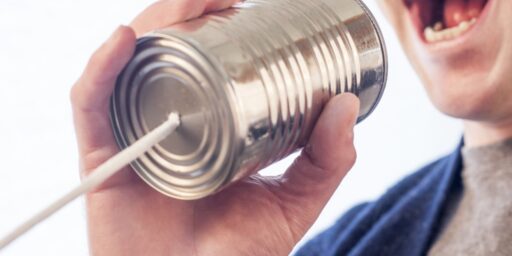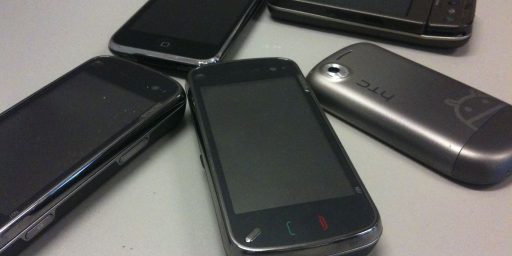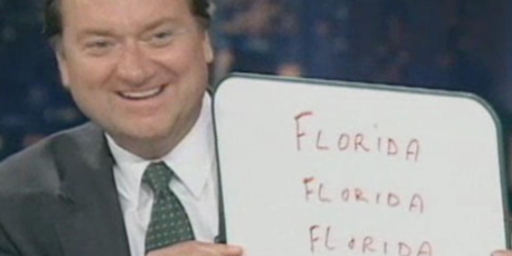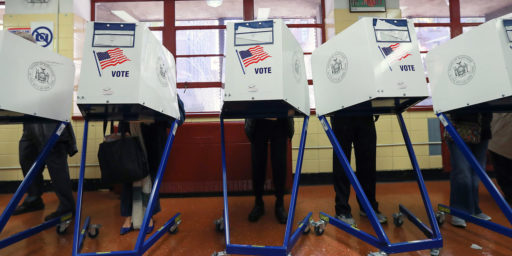It’s Illegal to Photograph Your Ballot. In America.
Posting pictures of your ballot to Facebook, Twitter, and Instagram is a crime in some parts of America.
In our share-everything social media world, people are photographing their ballots with their smartphones and posting to Facebook, Twitter, and Instagram. That’s apparently a crime in some parts of America.
Lauren Good for All Things D (“If You Want to Stay Out of Jail, Don’t Instagram Your Ballot“):
It’s Election Day. It’s exciting. It has been exhaustively covered, and it is completely expected that people have and will express their opinions through social media like Facebook, Twitter and Instagram. Google’s YouTube is evenencouraging voters to document their voting process.
But should you use your smartphone to photograph your ballot? Well, that all depends on where you’re voting.
According to the Citizen Media Law Project’s Web site, some states, including Florida, Georgia, Kentucky, Michigan, Nevada and Texas, “expressly prohibit the use of photographic and recording equipment inside polling places.”
The site also offers a handy chart summarizing the laws in each state around documenting your vote.
One voter in North Carolina, where it’s illegal to take photos of completed ballots, under Statute 163 – 166.3 (sections b and c), was stripped of his smartphone when he took it out to consult his list of chosen candidates.
The state of Wisconsin is taking an even harder line, with the Government Accountability Board telling voters that posting completed ballot pics to Facebook or Twitter constitutes election fraud under the state’s law — a Class I felony. (It’s also not the first time the Wisconsin GAB has warned of this.)
Why one earth should it be illegal to snap a picture of your own ballot? How could that possibly constitute voter fraud? For that matter, why can’t voters look at their phone to see who they’re supposed to vote for? How is that any worse than using a paper sample ballot handed out by some yahoo electioneering on the sidewalk outside the polling place?
This, of course, I fully understand:
It’s worth noting that many states prohibit activities that interfere with other people’s voting processes. So, even if photography is allowed in your polling place, disrupting or intimidating someone else, or capturing an image of their ballot, might be a big no-no.
Well, duh. Obviously, if we’re going to have a secret ballot, people shouldn’t be allowed to take photos of other people’s ballots. But their own? What’s the harm in that?
UPDATE: Megan McArdle disagrees:
Votes used to be widely available in America for outrageously small sums of money, or free whiskey. But that was back in the 19th century, before secret ballot measures were adopted. Now the buyer of votes has a grave difficulty: people might take your money, and then pull the lever for the other guy.
Enter the camera. As inexpensive snapshot cameras became available, the vote-buyers were potentially back in business; just demand that the voter mark his ballot in indelible ink and then take a picture.
I err on the side of fewer government regulations wherever possible, but this law seems basically sensible to me, even though I know that none of my facebook friends were trying to collect on a completed sale. The only way to keep vote buying from making economic sense is to make it impossible to verify how a vote was cast. And the only way to do that is to collectively decide that none of us will take pictures, even for innocent purposes.
This rationale may indeed explain why the laws were enacted. Regardless, though, they strike me as silly in practice, particularly in a share-everything world. How much vote buying is going on, versus Instagramming? Prohibiting the latter to suppress negligible amounts of the former strikes me as unreasonable.
via Aaron Brazell






Taking my photo in a poling place is an invasion.
Yes…taking a picture of your ballot is innocuous.
But do we need to have people stationed there to police who is taking photos of what?
If you want to photograph your ballot, vote absentee and take a picture at home.
It’s illegal in some places probably because it enables vote buying.
It’s illegal in some places probably because it enables vote buying.
This probably is/was the main reason for prohibition.
It’s illegal in some places probably because it enables vote buying.
Yes, this is why.
Not to mention, photos of election officials stuffing ballots wouldn’t be good.
Even this doesn’t demonstrate a commitment to a fair election.
Vote buying, yes, but also intimidation. I wonder how many husbands ask their wives to photograph their ballots just to, you know, make sure they did the right thing.
As Clavin suggests, it’s not an unreasonable rule, if taking pics of other voters is worth prohibiting. then a general rule vs. taking pics makes sense.
I hadn’t thought of the vote-buying angle, but that’s valid too.
Of course, if Smartphones are prohibited, that prevents someone like this fellow from recording the evidently-hacked electronic voting machine that’s changing his Obama vote to a Romney vote.
http://t.co/GC4lU2Cf
Gee, could THAT be what election officials don’t want recorded?
Funny that the laws are in primarily right leaning states. Imagine the Fox News freak out if these laws weren’t already enacted and Obama/various Dems proposed them.
@KarenJ: Can you imagine an elections administrator intentionally buying opaque vote machining equipment? Who can not imagine this? The machines should of course have never been purchased, nothing that doesn’t leave an indelible trail should ever be used. Elections administration has always been a criminogenic environment.
Good for the picture taker – may we have more of them until the vote factories are all gone.
Didn’t stop Sean Hannity from breaking NY state law. He did however delete the tweet, only after he realized it was illegal.
But, just like the waterboarding, I’m sure nothing will come of this.
http://thegrio.files.wordpress.com/2012/11/sean-hannity-ballot-tweet.jpg
Who’s to say that just because I share it with everyone, one of those everyone isn’t paying me to vote a certain way?
Megan is right about the rationale. I am familiar with it more in other countries than the US. When I was an electoral monitor in Colombia we were told that it was illegal to have a cell phone out at the polling place.
While I would not expect a lot of vote-buying in the US, it is certainly a theoretical possibility, as cell phone photos of ballots is pretty much the only way one could prove how one voted.